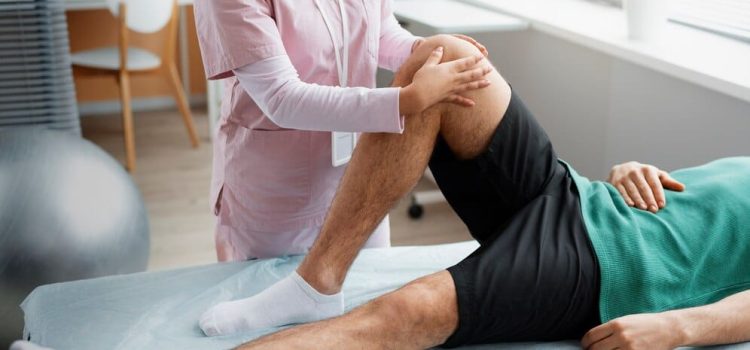Knee Replacement Surgery Recovery Tips
Recovering from knee replacement surgery is a crucial part of your healing journey. At Synovia Health, we provide affordable and high-quality body treatments, surgeries, and wellness programs to help you recover better and faster. If you or your loved one has recently had knee surgery, following the right knee replacement surgery recovery tips can make a big difference in your results.
In this article, we’ll walk you through essential tips for a smooth and steady recovery. We’ll use simple words, helpful steps, and expert guidance to ensure you feel confident throughout the process.
What Is Knee Replacement Surgery?
Knee replacement surgery, also known as knee arthroplasty, is a procedure where a damaged knee joint is replaced with artificial parts. It is usually done for people suffering from severe arthritis or joint damage due to injury or aging.
Most people who go through this surgery feel a big improvement in their pain and mobility. But the key to getting the best results lies in how well you manage your knee replacement recovery.
Why Recovery Is So Important
The success of your surgery doesn’t end in the operation room. Your recovery plan is just as important. It includes managing pain, doing exercises, eating right, and following your doctor’s instructions. Good recovery helps:
Reduce pain and swelling
Improve joint movement
Prevent infections or complications
Return to daily activities faster
Top Knee Replacement Surgery Recovery Tips
1. Follow Your Doctor’s Advice
Always stick to the recovery plan your surgeon gives you. This may include medications, rest, exercises, or physical therapy. If you have any doubts, don’t hesitate to contact your doctor.
Need help? Whatsapp +91 93100 28527, Call us at +1-443-335-9414 or email care@synoviahealth.com for personalized recovery plans.
2. Take Pain Medicine As Prescribed
Pain is a normal part of healing, but you should not ignore it. Taking medicine on time can help you move better and sleep well. Do not stop or skip doses without checking with your doctor.
3. Keep the Knee Clean and Dry
Proper wound care is a must. Follow these tips:
Change bandages as directed.
Don’t soak the knee in water.
Watch out for signs of infection (redness, pus, fever).
If you see anything unusual, contact Synovia Health right away.
4. Start Gentle Movement Early
Even small movements can help blood flow and prevent stiffness. Begin light exercises such as ankle pumps or straight leg raises (if advised) within a few days.
Note: Your physical therapist will guide you on how and when to start.
5. Do Your Physical Therapy Exercises
Physical therapy is one of the most important knee replacement recovery tips. It improves:
Muscle strength
Flexibility
Walking ability
Try to attend all your scheduled sessions and practice your exercises at home too.
6. Use Assistive Devices Properly
After surgery, you may need:
Crutches
Walkers
Knee braces
Using these tools correctly helps protect your new joint and lowers your risk of falling.
7. Stay Safe At Home
Before you return home, make sure your space is ready:
Remove loose rugs or wires
Use a firm chair with arms
Keep essentials within reach
Install bathroom handrails if needed
These changes make your home safer during recovery.
8. Eat Nutritious Foods
Eating the right foods can speed up healing. Include:
Lean proteins (chicken, eggs, lentils)
Fresh fruits and vegetables
Whole grains (brown rice, oats)
Healthy fats (nuts, olive oil)
Also, drink plenty of water and avoid too much sugar or processed foods.
9. Avoid Certain Activities
Some movements and habits can slow down recovery or even damage the new knee. Avoid:
Crossing your legs while sitting
Sitting in low chairs
High-impact sports like running or jumping
Lifting heavy items
Stick to your doctor’s advice for what is safe.
10. Stay Positive and Be Patient
Healing takes time. Don’t get discouraged if progress is slow. Celebrate small wins like walking with less support or climbing stairs with ease. Keep a positive mindset and stay motivated.
How Long Does Recovery Take?
Recovery time varies for each person. Here’s a general timeline:
First 2 weeks: Focus on pain control and gentle movements.
2 to 6 weeks: Start walking with less support, increase exercises.
6 to 12 weeks: Resume light daily activities, some may drive again.
After 3 months: Many people return to most normal tasks.
Full recovery may take 6–12 months.

When to Contact Your Doctor
Call your doctor or Synovia Health if you experience:
Severe pain that doesn’t go away
Swelling that gets worse
Fever or chills
Bleeding or pus from the wound
Difficulty moving your leg
How Synovia Health Can Help
At Synovia Health, we offer expert care before and after surgery. Our team of doctors, therapists, and support staff make sure you get the best results at affordable prices. Whether you need guidance for physical therapy, diet, or wound care, we are here for you.
For more information or bookings, contact: Whatsapp +91 93100 28527, Phone: +1-443-335-9414 Email: care@synoviahealth.com
Final Thoughts
Recovering from a knee replacement doesn’t have to be hard. By following these knee replacement surgery recovery tips, staying active, eating right, and listening to your doctor, you can regain movement and live pain-free.
If you need personalized care or have questions about your recovery journey, reach out to Synovia Health today. We’re committed to helping you heal better, faster, and with confidence.

